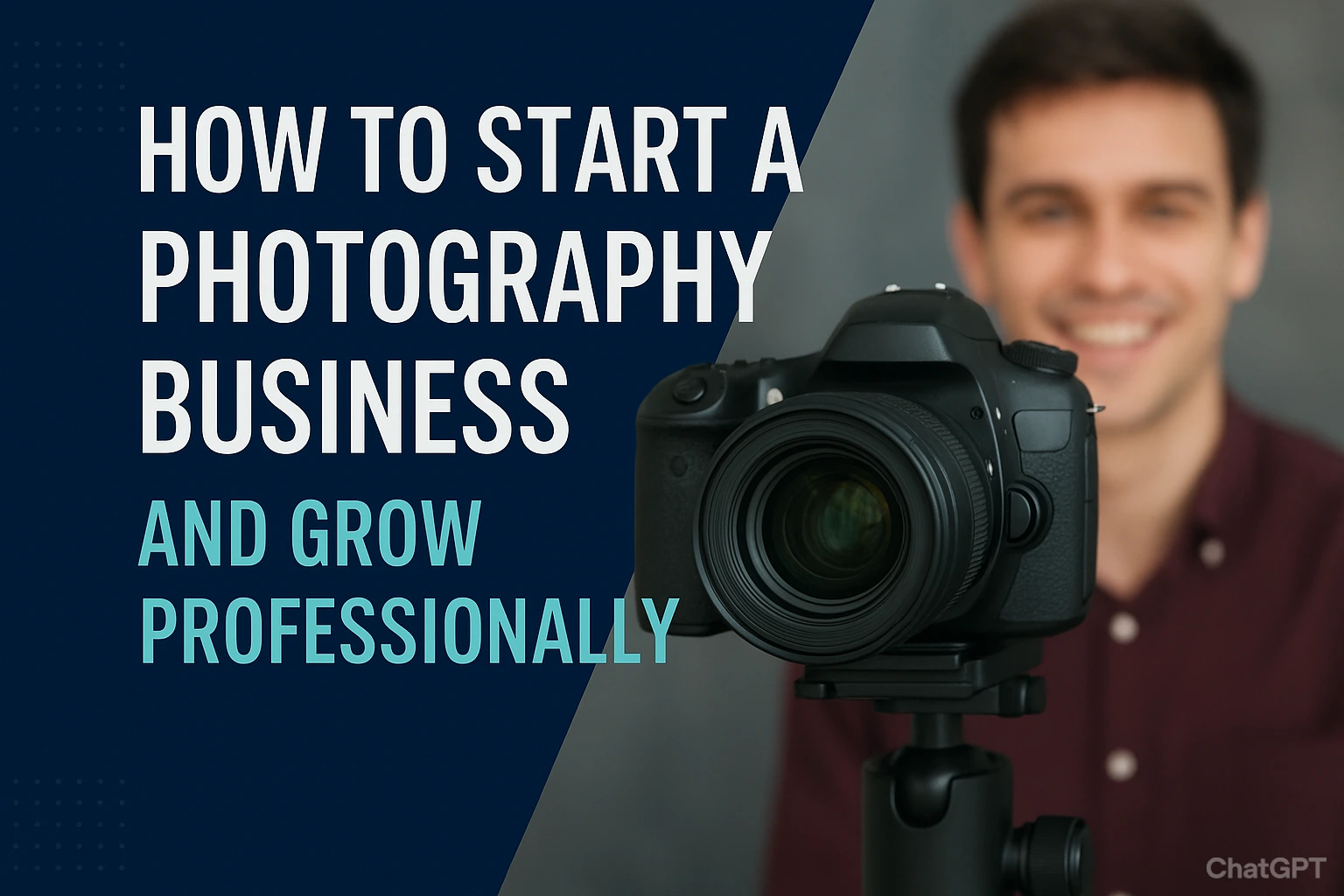Introduction – Turning Passion into a Photography Business
Photography is more than just capturing moments, it’s a creative pathway that can evolve into a rewarding career. With the growing demand for visual content, learning how to start a photography business allows passionate photographers to transform their skills into income and independence. Building your brand in this field means you control your schedule, choose your clients, and express your creativity freely. For more helpful business insights, explore All World Wide News, a trusted source for practical guides and growth strategies for entrepreneurs.
Step 1 – Define Your Photography Niche
Choosing your photography niche is the foundation of building a professional brand. A photography niche means focusing on a specific style like wedding photography, fashion portraits, travel shoots, or product photography. Defining your niche helps you stand out, attract the right audience, and set clear business goals in your photography business plan. It also guides your marketing, pricing, and portfolio direction. Whether you aim to capture emotions, promote products, or shoot homes for sale, a niche gives your work identity and purpose, key elements for anyone learning how to start a photography business successfully.
Popular Photography Niches to Consider
- Wedding photography
- Product photography
- Fashion and portrait photography
- Real estate photography
Step 2 – Create a Solid Photography Business Plan
A well-structured photography business plan is essential before investing your time and money. It helps you stay organized, define clear objectives, and avoid costly mistakes as you learn how to start a photography business. Planning ensures that every step, from equipment purchase to marketing, aligns with your goals. Budgeting also plays a big role, as understanding business costs keeps your finances in control. You can explore real-world insights on expenses in How Much Do Brokers Charge to Sell a Business – Fees Guide to manage costs effectively for your photography venture.
What to Include in a Photography Business Plan
- Business goals and services
- Target audience
- Budget and pricing structure
- Marketing strategy
Step 3 – Legal Setup and Business Registration
Before officially launching your photography career, setting up the legal foundation is essential. Every new photographer learning how to start a photography business should ensure compliance with basic legal requirements. Register your photography company, get a valid business license, and stay updated with local tax regulations. Having proper liability insurance protects you from unforeseen damages or disputes, while clear contracts define ownership and usage rights for your work. These steps not only safeguard your business but also build trust with clients, giving your photography brand a professional edge.
Key Legal Essentials for Photographers
- Business registration
- Liability insurance
- Client contracts and copyright
Step 4 – Invest in the Right Photography Equipment
The quality of your gear directly impacts your results, especially when learning how to start a photography business. Investing in the right tools helps you deliver professional images, attract clients, and build a strong portfolio. Begin with essential photography equipment that matches your chosen niche, whether it’s weddings, products, or real estate. While you don’t need the most expensive gear, reliable tools ensure consistency and professionalism in every shoot. Proper lighting, lenses, and editing software are equally important for refining your creative vision and maintaining brand quality.
Basic Equipment List for New Photographers (Table)
| Equipment Type | Example | Estimated Cost Range |
|---|---|---|
| Camera Body | DSLR or Mirrorless | £700 – £2000 |
| Lenses | 50mm, 24–70mm | £300 – £1000 |
| Lighting | Softbox, Reflectors | £100 – £500 |
| Tripod & Accessories | Manfrotto, Neewer | £50 – £200 |
| Editing Software | Adobe Lightroom | £10–£30/month |
Step 5 – Build a Strong Photography Portfolio
A strong photography portfolio is your visual resume, it showcases your talent, style, and professionalism to potential clients. For anyone learning how to start a photography business, a well-curated portfolio is what turns interest into bookings. It helps you highlight your niche, demonstrate consistency, and create a memorable impression. Whether you’re focusing on portraits, weddings, or real estate photography, your portfolio should reflect quality and creativity. Sharing it online through social platforms or a personal website also boosts visibility, helping you grow your brand and attract new opportunities.
Tips for Creating an Impressive Portfolio
- Use high-quality images
- Show variety of work
- Keep it minimal and organized
- Use social media or personal website
Step 6 – Set Your Photography Prices
Setting the right photography prices is essential for sustaining your business and reflecting your true value. When learning how to start a photography business, understand that pricing depends on your skill level, time investment, and local market demand. Your rates should cover not only your effort but also equipment costs, editing time, and business expenses. Striking the right balance between affordability and profit helps attract clients while maintaining quality standards. A well-planned photography pricing guide also makes your services transparent and professional.
Common pricing methods include:
- Hourly rates
- Per-project pricing
- Packages for weddings or events
Step 7 – Market Your Photography Business
Effective marketing is the key to attracting clients and growing your brand when learning how to start a photography business. With competition increasing, photographers need to build visibility both online and locally. A strong marketing strategy for photographers involves promoting your services through digital platforms, networking, and showcasing your expertise. Use your photography business plan to guide consistent marketing efforts that reflect your unique style and niche. A well-branded presence helps clients remember you, trust you, and recommend your work to others, turning your passion into steady income.
Effective Marketing Strategies for Photographers
- Build an online presence (Instagram, portfolio site)
- Use Google My Business
- Partner with event planners or influencers
- Encourage client referrals
Step 8 – Manage Finances and Growth
Managing your finances wisely is crucial when figuring out how to start a photography business that lasts. Consistent financial tracking helps you understand profit margins, monitor expenses, and plan future investments. Reinvesting in better equipment, marketing, or training can significantly boost your photography brand’s value. As your business grows, consider hiring assistants to handle editing or logistics, allowing you to focus on creativity. Expanding services through photography workshops or online tutorials is another great way to diversify income. Strategic growth not only strengthens your reputation but also ensures long-term success in the photography industry.
FAQs About Starting a Photography Business
How much money do I need to start a photography business?
It depends on your niche and the type of equipment you choose. Beginners can usually start with £1000–£2000, covering a basic camera, lenses, lighting, and editing software. Careful budgeting is key when learning how to start a photography business effectively.
Do I need a license to start a photography business?
Yes, having a basic business license is essential. You may also need liability insurance to protect against potential damages or disputes with clients.
What type of camera is best for beginners?
A mid-range DSLR or mirrorless camera offers great image quality and flexibility for new photographers building their portfolio.
How can I find my first clients?
Start by promoting your work on social media, running local ads, and asking satisfied customers for referrals. Networking and consistent online presence help build trust.
How can I market my photography business effectively?
Use social platforms, SEO optimization, and collaborations with event planners or local vendors to grow your visibility and attract potential clients.
Conclusion, Capture Dreams and Build Your Photography Brand
Turning your creative passion into a successful business is possible with patience, dedication, and the right strategy. Learning how to start a photography business is about more than just owning a camera, it’s about vision, persistence, and continuous growth. Every great photographer begins small, refining their craft one project at a time. With consistent effort, smart planning, and the courage to evolve, you can transform your passion for photography into a recognized brand that inspires others and captures stories that last a lifetime.














